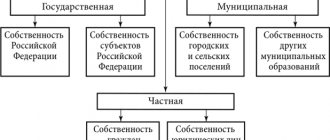The concept of “land ownership”
The object of ownership of land is a land plot. This concept is discussed in paragraph 3 of Art. 6 of the Land Code of the Russian Federation of October 25, 2001 No. 136-FZ (hereinafter referred to as the Land Code of the Russian Federation): this is an immovable thing that is a part of the earth’s surface and has characteristics that allow it to be defined as an individually defined thing.
The content of “property rights,” which applies to any objects of civil rights, including land plots, is established by civil law. According to Art. 209 of the Civil Code of the Russian Federation (Part 1) dated November 30, 1994 No. 51-FZ (hereinafter referred to as the Civil Code of the Russian Federation), the owner has the rights to own, use and dispose of his property. Relations of ownership, use and disposal of a land plot, which constitute the content of land ownership, are regulated by both land and civil legislation. Land legislation, perceiving the institution of “property rights”, cannot exclude any of the provisions constituting the rights of the owner, since a separate branch - land law - should not change the content of a general legal institution.
At the same time, given that land is an unusual object of law, the provisions of civil law on the possibility and criteria for regulating relations related to property rights and its implementation follow. So, in accordance with paragraph 3 of Art. 209 of the Civil Code of the Russian Federation “Content of Property Rights”, ownership, use and disposal of land is carried out freely, if this does not cause damage to the environment and does not violate the rights and legitimate interests of other persons.
The object of ownership of a land plot is a separate plot of land or a share in the right to it, owned by a certain entity.
Land ownership includes three main elements (powers) - possession, use and disposal of a land plot:
Ownership of a land plot is the basis for the emergence and termination of the right of lifelong inheritable ownership of a land plot. It creates the necessary prerequisites for the implementation of two other powers - use and disposal. Ownership of a land plot is the possession of a plot of land as property (for a legal entity this is the ability to list it on its balance sheet). In other words, “possession” means the possibility of allocating a plot of land, erecting fences, other fences, warning signs, and carrying out land surveying. Implementation of measures to protect the territory, registration of ownership or lease (sublease) of other citizens or organizations.
Land use is the right to use not only the surface of a land plot and its soil cover, but also the mineral resources and water resources available on the land plot, that is, the opportunity to extract useful properties. Also (if this corresponds to the intended purpose of the site), residential, industrial, cultural and other buildings and structures can be erected on it. That is, the use of a land plot is the use of a property in accordance with its purpose at the discretion and desire of the user and owner. Use is the assignment by the owner of the useful properties of an object. This means for the owner the opportunity to manage the land, protect against pests and create conditions for soil fertility, receive income from leasing or transferring ownership to other entities.
Disposal of a land plot is a way of implementing relations between the object and the subject of ownership; the right to decide how and by whom the land plot can be used; the opportunity for the owner to determine the legal fate of his land. Disposition - the ability to determine the legal fate of the subject of transactions: sale, exchange, division, lease, rent, and other actions. “Power” means the ability to change the category of a site at one’s own discretion, erect residential and commercial buildings, and set limits for land use.
About other rights
What is it about? Land as a special piece of real estate is considered in Russia simply because each plot is unique. And you can build a variety of objects on it.
However, we should not forget that according to the Civil Code of the Russian Federation, land is real estate. This means that the owner has the right to carry out the following operations:
- sale;
- rental;
- use for personal living/gardening/gardening;
- allocation of shares;
- alienation;
- use as collateral;
- transfer of rights by inheritance;
- re-registration of property by deed of gift.
In this area, as a rule, there are no questions. Considering a land plot as an object of ownership, as real estate, a citizen must remember that he has the right to do with his property as he wants, if this does not contradict accepted laws.
Land ownership of citizens and legal entities in the Russian Federation
Land ownership of citizens and legal entities is determined in accordance with Art. 15 Land Code of the Russian Federation:
- the property of citizens and legal entities (private property) are land plots acquired by citizens and legal entities on the grounds provided for by the legislation of the Russian Federation;
- citizens and legal entities have the right to equal access to the acquisition of land plots of ownership. Land plots that are in state or municipal ownership may be made available to citizens and legal entities, with the exception of land plots that, in accordance with this Code and federal laws, cannot be privately owned;
- foreign citizens, stateless persons and foreign legal entities cannot have ownership of land plots located in border territories, the list of which is established by the President of the Russian Federation in accordance with the federal legislation on the State Border of the Russian Federation, and in other specially established territories of the Russian Federation in accordance with federal laws.
In accordance with Art. 209 of the Civil Code of the Russian Federation, the owner has the right, at his own discretion, to take any actions in relation to his property that do not contradict the law and other legal acts and do not violate the rights and interests protected by law of other persons. At the same time, the ownership, use and disposal of land and other natural resources, to the extent that their circulation is permitted by law, is carried out by their owner freely, if this does not cause damage to the environment and does not violate the rights and legitimate interests of other persons.
According to land legislation, land must be used in accordance with its intended purpose, determined by belonging to a particular category of land, and permitted use. The owner of a land plot must carry out measures to protect land, comply with the specially specified requirements of regulations, rules and standards when using land plots, prevent pollution, littering, degradation and deterioration of soil fertility on lands of the relevant categories, fulfill other duties provided for by the Land Code of the Russian Federation and other federal laws. laws.
The law also provides for restrictions in certain cases on the powers of the owner to dispose of a land plot. Yes, Art. 37 of the Land Code of the Russian Federation provides for special requirements for the procedure for concluding agreements for the purchase and sale of land plots.
Objects of land ownership have the following characteristics:
- identification – individual characteristics, such as: cadastral number, specific location or address, type of permitted use, intended purpose;
- volume of ownership - single right of ownership or share in property; cadastral value;
- the possibility of making transactions with it - participation in free (market) turnover.
Proof of rights
A land plot as an object of land relations is a limited top layer of soil, the rights to which are regulated by the Civil Code and the Land Code of the Russian Federation. After their registration in Rosreestr, the citizen will be given a document indicating ownership.
Until 2021 in Russia they issued:
- cadastral passport;
- certificate of ownership of property.
However, new legislative changes have led to the fact that these papers are now abolished. They were replaced by an extract from the Unified State Register. It is issued after registration in the Register and serves as a replacement for a certificate of ownership. You can update your certificate at any time, but for a fee.
Restrictions on ownership of land objects
In accordance with Art. 213 of the Civil Code of the Russian Federation, citizens and legal entities may own any property, with the exception of certain types of property, which, in accordance with the law, cannot belong to them. Thus, not all land plots can be owned by private individuals. The list of lands withdrawn from circulation, which cannot be in private ownership, and lands limited in circulation, which are not subject to transfer into private ownership, except in cases established by federal law, are defined in Art. 27 of the Land Code of the Russian Federation “Limitations on the turnover of land plots”:
- plots withdrawn from circulation that are in state and municipal ownership: nature reserves, national parks (except for cases specifically provided for in Article 95 of the Land Code of the Russian Federation);
- territories limited in circulation (for example, lands belonging to the forest fund);
- within which water bodies that are in state and municipal ownership are located;
- occupied by especially valuable objects of cultural heritage of the peoples of the Russian Federation, objects included in the World Heritage List, historical and cultural reserves, objects of archaeological heritage, museum reserves;
- provided to ensure defense and security, defense industry, customs needs, communications needs, occupied by space infrastructure facilities.
Objects
What are the objects of land ownership? A plot of land is what it is. More precisely, as already mentioned, a part of the earth that has certain boundaries.
In addition, the object of ownership is a share in real estate. This arrangement occurs quite often. Land, like other property, can have several owners. In such circumstances, the owners will have the same rights and obligations. Conducting transactions with property that is in shared or common ownership can be problematic.
Legal basis of ownership of objects of land relations
The possibility of registering land ownership is provided for by the Constitution of the Russian Federation. In Part 2 of Art. Article 9 of the Basic Law stipulates that land and other natural resources can be in private, state, municipal and other forms of ownership. The grounds for transferring land rights are established by Russian legislation. In particular, in paragraph 2 of Art. 15 of the Land Code of the Russian Federation “Land Ownership of Citizens and Legal Entities” states that citizens and legal entities have the right to equal access to the acquisition of land plots. Ownership of land is protected by law. The owner has the right to reclaim his land plot from someone else's illegal possession in accordance with Art. 301 and 303 of the Civil Code of the Russian Federation, as well as to demand the elimination of any violations of his rights, even if these violations were not associated with deprivation of possession (Article 304 of the Civil Code of the Russian Federation).
The grounds and procedure for the emergence of ownership of land plots are defined in the relevant articles of Chapter. VV.6 of the Land Code, and the grounds and procedure for terminating the right of ownership of land plots, as well as the provided restrictions on the right of ownership, are in Chapter VII of the Land Code of the Russian Federation.
Author of the article
Properties
A land plot as an object of land relations (including property) has all the properties of real estate. In addition, it is negotiable.
What does it mean? Objects of this type can be freely transferred from owner to owner, as well as alienated, unless otherwise provided by law.
Land as an object of property rights in Russia is considered unique property. That is why it is necessary to know everything about the regulation of legal relations of land type.





